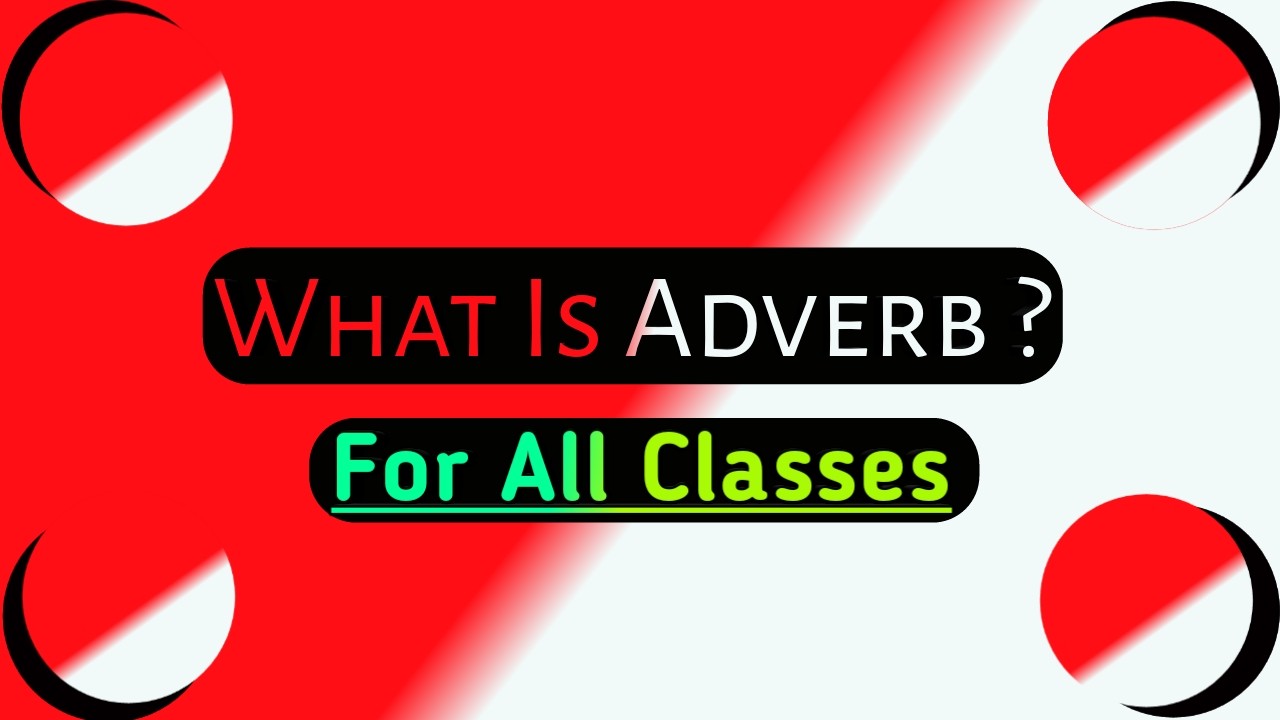Today, I am going to discuss a topic that is about adverbs. It means, here you will know, what is adverb? and how to use it in sentences.
Normally, I have seen that the students use adverbs in the sentences in the wrong way. Sometimes, teachers also make the same mistake.
But, if you have better knowledge of this part of speech, I’m quite sure that there will be no problem with using adverbs in the sentences.
Hence, without wasting your valuable time let’s start the topic.
Read also, what is a pronoun?
Table of Contents
What Is Adverb With Examples For All Classes ( 36 Examples ) –
What is adverb ? –
An adverb is a word, which qualifies an adjective. In other words, an adverb qualifies a verb, adjective, adverb, preposition and a sentence as well.
For example –
( a ) His father works hard.
Here, the word hard is qualifying work ( verb ).
( b ) Surendra is very beautiful.
Here, the word very is qualifying beautiful ( adjective ).
( c ) His mother works very hard.
Here, the word very is qualifying hard ( adverb ).
( d ) Karan is flying the kite exactly over Vimal’s house.
Here, the word exactly is qualifying over ( preposition ).
( e ) Fortunately, I got an opportunity.
Here, the word, fortunately, is qualifying the whole sentence.
In all these examples, hard, very, exactly, fortunately are adverbs.
Now, I hope that you will completely have understood, what is adverb?
Types of adverb –
There are totally three types of adverbs.
- Simple Adverb
- Relative Adverb
- Interrogative adverb
1. Simple Adverb –
Simple adverbs are the adverbs, which refer to time, place, number, reason, manner, degree and these are commonly seven types.
( a ) Adverb of Manner –
For example – Honestly, slowly, gladly, etc.
( b ) Adverb of Place –
For example – anywhere, here, there, below, above, down, up, out, in, etc.
( c ) Adverb of Time –
For example – late, now, after, ago, early, then, soon, today, tomorrow, etc.
( d ) Adverb of Degree –
For example – much, more, very, too, little, almost, quite, etc.
( e ) Adverb of Frequency or Number –
For example – always, never, twice, thrice, once, seldom, often, frequently, etc.
( f ) Adverb of Negation –
For example – no, not, never, etc.
( g ) Adverb of Affirmation –
For example – truly, surely, etc.
2. Relative Adverb –
Relative adverbs connect two sentences and tell time, place, reason and manner.
For example –
( a ) Ramesh doesn’t know where she is working now.
( b ) I will go to school when my father says.
( c ) He will provide the right information when I tell the secret.
3. Interrogative adjective –
For example –
Why, where, how, when, etc.
Usage –
( a ) Why are you depressed?
( b ) Where has she scolded him?
Degree of comparison –
Some adverbs also have a degree of comparison like adjectives.
| Positive | Comparative | Superlative |
| Late | later | latest, last |
| Well | better | best |
| Much | more | most |
| Little | less | least |
| Soon | sooner | soonest |
| Hard | harder | hardest |
| Near | nearer | nearest |
| Fast | faster | fastest |
| Early | earlier | earliest |
| Far | farther | farthest |
| Forth | further | furthest |
| Slowly | more slowly | most slowly |
| Swiftly | more swiftly | most swiftly |
| Beautifully | more beautifully | most beautifully |
| Carefully | more carefully | most carefully |
Some special cases of adverbs –
1. Position of adverb –
Keep in mind, the position of adverbs always matters. I’m giving some examples below to understand it.
( a ) Only he saw my abs.
( It means, only he )
( b ) He only saw my abs.
( It means, only saw )
( c ) He saw only my abs.
( It means, only my )
( d ) He saw my only abs.
( It means, only abs )
( e ) He saw my abs only.
( It means, abs only )
All these sentences have different meanings due to the different positions of adverb ( only ).
2. Wrong use of adverb –
Basically, we know that the words, which include ly at the end are adverbs, but some words, which include ly at the end are not adverbs, but adjectives.
For example –
Niggardly, Miserly, Cowardly, Scholarly ( All these are adjectives ).
Usage –
( a ) Kamal faced the robbers Cowardly.
it’s a wrong sentence because cowardly is an adjective, it’s not an adverb and its right sentence will be, Kamal faced the robbers in a cowardly manner.
( b ) He spent his money miserly.
It’s a wrong sentence because miserly is an adjective, it’s not an adverb and its right sentence will be, he spent his money in a miserly manner.
3. Same words as adjective and adverb –
For example –
Hard, loud, fast, long, near, early, etc.
Usage –
( a ) Jyoti works hard.
Where hard is an adverb.
( b ) I am doing hard work.
Where hard is an adjective.
( c ) Run fast lest you should miss the train.
Where fast is an adverb.
( d ) Srinivas is a fast runner.
Where fast is an adjective.
( e ) The principal talks loud.
Where loud is an adverb.
( f ) The people should avoid taking in a loud tone.
Where loud is an adjective.
4. Use of adverb ( very & much ) –
A. Use of very –
( 1 ) The adverb ( very ) is used to only a positive degree.
For example –
( a ) Shiva is a very good person.
( b ) His father is very lucky that he has two sons and one daughter.
( c ) The shopkeeper is very honest.
Where good, lucky, honest are positive degrees.
( 2 ) It’s also used in the form of ( very much + comparative degree ).
For example –
( a ) Now, he is in very much better condition.
( b ) You are a very much luckier person.
( c ) Abhishek is very much wiser.
( 3 ) The adverb ( very ) is also used with the present participle.
For example –
( a ) The juggler presented his skills in a very interesting way.
( b ) The show was very entertaining.
( c ) Rohit Shetty gave a very daring task.
Exception – very tired, very limited, very pleased, very contented, very discontented, very drunk, very delighted.
B. Use of much –
Much is used with a comparative degree.
For example –
( a ) Iron man has much better powers than Hulk.
( b ) Nidhi is much wiser than Shivani.
5. Use of enough –
Enough is used both as an adjective and adverb. When the word ( enough ) is used as an adjective, it’s used just before the noun.
At the same time, when the word ( enough ) is used as an adverb, it’s used just after the adjective.
For example –
( a ) Dinesh has enough money in his car.
Where enough is an adjective because it has been used just before the noun ( money ).
( b ) Usain Bolt is tall enough.
Where enough is an adverb because it has been used just after the adjective ( tall ).
Final words –
Finally, I hope that the article must have fulfilled your needs and now you will have no doubt about, what is adverb? because I have covered all the important details about adverbs.
If you really enjoyed the article, please share it with those who need it.
Thank you.








